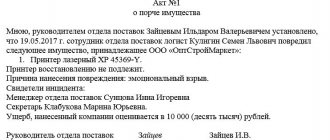How to draw up a petition to obtain evidence so that the court will satisfy it? We know the answer to this question and we will tell you. If you have any questions, please address them to the site’s lawyer on duty, and advice will be provided promptly.
The procedure for considering any civil case, in essence, represents an assessment of the circumstances and evidence by the judge from the point of view of legal norms. Evidence in a civil case is provided to the court by the parties and third parties when filing a claim in court, in a response to the statement of claim, by attaching documents, etc. When it is impossible to submit the original documents yourself, filing a petition to obtain evidence will help.
Most often, original documents are requested when considering cases of administrative proceedings (decisions of authorities), when compensating for damage from a crime (documents drawn up during the investigation), on the protection of honor and dignity (materials from media editorial offices), etc. But in principle, you can ask the court to request evidence from authorized persons in any case. It is only important to correctly substantiate your application.
:
Request for evidence
Petition to request documents
Both in civil and arbitration proceedings, the responsibility for collecting and presenting arguments rests with the participants in the process (Article 57 of the Code of Civil Procedure of the Russian Federation and Article 66 of the Arbitration Procedure Code of the Russian Federation). Evidence is provided by the parties when:
- filing a claim;
- providing a response to the claim;
- filing an application for inclusion of materials, etc.
However, cases cannot be excluded when the parties cannot independently obtain the necessary originals from third parties, commercial organizations or government agencies. In this case, the participant in the process applies to the court with a corresponding petition.
In most cases, such problems arise when the requested documentation contains information that is a secret protected by law. It can be:
- criminal investigation materials;
- information about income/loans;
- health certificates, medical reports, etc.
Such a petition can be submitted at any stage of the process before a decision is made on the case. If the request is justified and it is impossible to obtain information on its own, the court:
- transmits to the applicant a request for presentation to a person who has the necessary information;
- sends the request independently to the location of the materials.
For refusal to provide the requested information, the law provides for fines:
- Article 57 of the Code of Civil Procedure of the Russian Federation provides for a fine of 500 rubles for citizens and 1000 rubles for officials;
- Articles 66 and 119 of the Arbitration Procedure Code of the Russian Federation establish a fine of up to 2,500 rubles for citizens, for officials - up to 5,000 rubles, and for organizations - up to 100,000 rubles.
At the same time, payment of a fine does not relieve the person who has the requested evidence from the obligation to provide it to the court.
How to make an oral request for the inclusion of evidence
I’ll tell you about the algorithm of actions for filing an oral petition for the inclusion of evidence:
- you need to prepare in advance the evidence that you want to attach to the case (for example, bring copies of documents with you to the meeting, have them properly certified, take the original for verification);
- at the beginning of the hearing, the judge will invite the parties to file a motion - they need to stand up, clearly voice their request, describe the evidence, and briefly indicate its relevance to the case;
- the judge must ask the opinion of all participants in the case about the possibility of including evidence (they can object, agree, or leave the question at the discretion of the judge);
- if after discussion the judge decided to attach evidence to the case, all participants in the case can familiarize themselves with it and receive copies (if possible);
- the examination of evidence will take place towards the end of the process, which the judge will definitely explain to the parties.
Find out more Deferment of a court decision: when can you get a sample application
Note! All oral motions are recorded in the protocol and must be examined by a judge and a ruling is made. Later, you can check whether your petition was included in the minutes, listen to the audio recording of the meeting (it is required to be recorded in any case).
In the same way, you can make an oral request for the inclusion of evidence at any time during the hearing until the judge makes a decision. To announce a request, you need to raise your hand, voice the petition with the permission of the judge, and hand over the evidence for review.
Features and design rules
In accordance with procedural law, the petition must have the following structure:
- Introductory part. Includes a “header” that indicates the name of the court, full name. and the applicant's contact details, as well as the case number.
- Main part. Here you need to outline the essence of your request: what information needs to be requested, what legally significant circumstances it confirms, why you cannot get it yourself, and who has it.
- Resolution part. In this paragraph, it is necessary to indicate the requirement itself, for example, “I ask you to request reports of road accidents from the Krasnensky Ministry of Internal Affairs of the Belgorod Region.”
- Your signature and date of application. This is followed by a list of applications (if necessary).
Actions of the court
Any petition submitted by the parties is discussed in a court hearing to clarify the opinions of the parties, lawyers and third parties with the right to present independent claims.
After listening to the opinions of the participants in the process, the judge makes a decision on the spot, that is, without going to the deliberation room. The court's decision on the petition is brought to the attention of the participants in the process and entered into the minutes of the court session.
If the petition is granted, the court will draw up a corresponding request, which can be sent to the addressee by mail or can be handed to the participant in the process who filed the petition, so that he personally submits the request to the required authority.
Petition for the collection of evidence in the arbitration process
Its execution is regulated by Article 66 of the Arbitration Procedure Code and has similar content requirements as in civil proceedings. In addition, the arbitration court has the right to request information on its own initiative:
- if documents were not provided by state bodies in cases arising from public legal relations (clause 5 of article 66 of the Arbitration Procedure Code of the Russian Federation);
- if the applicant did not provide materials in the case of collection of mandatory payments and sanctions (clause 5 of Article 215 of the Arbitration Procedure Code of the Russian Federation);
- if the foreigner has not provided official confirmation of his legal status or right to engage in business or other economic activity (clause 3 of Article 254 of the Arbitration Procedure Code of the Russian Federation).
If the court is not convinced by the arguments presented in the petition and it refuses you, then its decision can be challenged and the petition can be submitted again at the next instance.
How to compose it correctly?
A petition to request documents must contain the following information: information about the author of the application: Full name. (name of organization), residential address; name of the court; document's name; description of the case: number where it is being considered, the subject of the dispute, information about the parties; a brief description of the main circumstances of the case; an indication that Article 56 places the burden of proof in civil proceedings on the party who refers to the circumstance; a description of where and why the required item is located; an indication that the applicant has no legal basis to oblige the owner to provide the necessary evidence (preferably with reference to the law); link to Article 57 of the Code of Civil Procedure of the Russian Federation; description of the requirements: what to demand and from which person; list of attached documents; signature, date, surname and initials.
The petition will be granted if the fact cannot be established otherwise. In cases where a participant in a legal dispute has other means of proof, he must use them and not involve another person in the process. Also, the circumstance confirmed by requesting evidence should influence the court’s assessment of other facts. The petition must be drawn up taking into account the facts to be proven, the position of the party, the requirements of the plaintiff and other circumstances. The court does not grant the request in all cases. The application may be rejected if the government body does not consider it necessary to establish the facts specified in the application during the proceedings. Or it will be established that a person has access to another method of obtaining evidence, albeit longer in time or requiring additional material costs.
How to prove your position in court?
How to request evidence in court
In addition, the reasons why it is impossible to obtain items or documents that can prove guilt or innocence must be specified. Thus, the court’s assistance in obtaining evidence can play a key role if the strategy is built as competently as possible. The court is obliged to issue a request to the party who does not want to distribute the information; if the request is approved, the party will receive what it needs. This scheme works ideally in courts of general jurisdiction.
Grounds for application
Not all documents and other evidence that are essential for a comprehensive consideration of a civil case can be obtained directly by the plaintiff or defendant, or even by their lawyers. The special regime for some documents allows them to be obtained only on the basis of a judicial request.
In these cases, parties who are aware of the existence of such a document or any other type of forensic evidence and believe that its examination is important in determining the claim may ask the court to request evidence from the appropriate public or private entity or organization.
Judicial request
In addition to the fact that the judicial body can help citizens by independently obtaining documents relevant to the case, it can interact with other courts. This may be necessary in order to be able to interview necessary witnesses or to ask another court to assist in collecting documentation.
Contracts and other relevant legal documents. Such interaction is carried out by sending requests to the court for information.
It can be issued either in writing or electronically. The latter is used most often now.
This is due to the fact that requests are sent to different regions that are very far from each other. In order to speed up this process, the court can use the channel of interdepartmental interaction.
Another judicial body is given a month to comply with the court's request. As part of such cooperation, citizen surveys can also take place. It happens like this: two courts begin active interaction via conference channels. The witness presents information known to him, which is recorded by another body.
READ How can an orphan get an apartment from the state after 23 years of age: what documents are needed
In addition, the results of the examination may be submitted in written form. An expert may also be interviewed to clarify the results of his conclusion.
Another judicial body may refuse to cooperate only if the requested actions cannot be carried out for objective reasons that do not depend on the will of the parties.
A petition for a request for documents by the court within the framework of intradepartmental cooperation must include the following elements:
- name of the ship of the sender and recipient,
- the essence of the request and the list of necessary actions,
- the period during which this must be accomplished, etc.
In essence, there is no petition to issue a judicial request. This is due to the fact that only the court itself can make this decision. Neither party in the case can ask for this. This provision is enshrined in the civil procedural legislation of the Russian Federation.
Judicial request
Possible reasons for deviation
Typically, courts always grant such requests, since this is largely in their interests: without solid evidence, it will be extremely difficult to make a reasoned decision. However, in some cases, the judge may decide that the request should be denied. The reasons may be as follows:
- It is not indicated which specific documents, and for what specific purposes, must be requested. In this sense, a citizen should be extremely careful. Otherwise, it is unclear what exactly the party wants to prove using these papers.
- It is quite common for a petition to be submitted clearly untimely. For example, if the judge decided that it was time to sum up the results and go to make a decision, and at this moment a request is submitted, he may consider this an abuse of law, citing, for example, Article 10 of the Civil Code. Such justification in some cases may be purely formal, so the citizen should continue to defend his rights while filing an appeal.
- Finally, if a citizen asks for documents that he can obtain himself
In any case, the party whose request is denied may file an appropriate appeal after the decision has been rendered.





